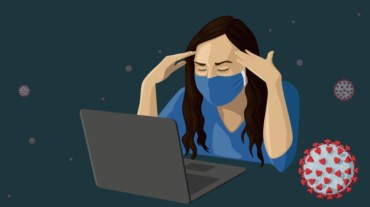
From the World Health Organization to expert psychologists, everyone in the world is talking about how covid-19 and how it is impacting our mental health. In fact, recently WHO shed light on how the pandemic is coming in the way of seeking professional help on matters of the mind.
Not just that, people are getting more and more anxious about stepping again and adapting to the ‘new normal’. “It is this overthinking that is leading to paranoia. This kind of anxiety isn’t normal and that’s why it is called out to be pathological in nature,” explains Dr. Santosh Bangar, consultant psychiatrist, Global Hospital, Mumbai.
And now there is a new study that’s making a case for the mental health after-effects of being infected by covid-19.
According to a report published in The Clinical Neuropsychologist, people who recover from covid-19 infection may experience “brain fog” and other neurological symptoms due to post-traumatic stress disorder (PTSD)—an effect observed in past human coronavirus outbreaks such as SARS and MERS.
Also, wtach:
Here’s how people infected by covid-19 can develop PTSD
People who have recovered from covid-19 sometimes experience lingering difficulties in concentration, as well as headaches, anxiety, fatigue or sleep disruptions. Patients may fear that the infection has permanently damaged their brains, but researchers say that’s not necessarily the case.
A paper co-authored by clinical professor and neuropsychologist Andrew Levine, MD, of the David Geffen School of Medicine at UCLA, and graduate student Erin Kaseda, of Rosalind Franklin University of Medicine and Science, in Chicago, explores the historical data on survivors of previous coronaviruses, which caused severe acute respiratory syndrome (SARS) and the Middle East respiratory syndrome (MERS).
“The idea is to raise awareness among neuropsychologists that PTSD is something you might want to consider when evaluating persistent cognitive and emotional difficulties among covid- 19 survivors,” says Dr Levine.
“When we see someone for neuropsychological testing, we expect them to be at their best, relatively speaking,” he adds.
Select Topics of your interest and let us customize your feed.
PERSONALISE NOWHe adds, “If we identify a psychiatric illness during our evaluation, and if we believe that condition’s symptoms are interfering with their ability to perform at their best, we would want that treated first and then retest them once it’s under control.”
If the symptoms are due to, even partially, a psychiatric condition such as PTSD, treatment will help manage those symptoms, and provide a clearer view of any underlying brain issues.
“Once they have treatment, and hopefully have some remission of their psychiatric symptoms, if the cognitive complaints and the deficits on neuropsychological tests are still there, then that’s more evidence that something else is going on,” Kaseda says.
Also, watch:
“It’s going to be important for clinicians across the board to be keeping up with the literature that’s coming out, to make sure they have the most up to date information as these survivors are starting to present for neuropsychological testing”, Kaseda added.
The trauma can also lead to hallucinations
Kaseda began pursuing this question based on her experience working with patients with mild traumatic brain injury, such as concussion.
“When these symptoms persist for months or years after the original injury, it’s much more likely to be due to the presence of a psychiatric disorder,” she says.
A review of data from the SARS and MERS outbreaks showed that those survivors had heightened risk for PTSD. In the case of covid-19, the symptoms of PTSD may arise in response to the invasive measures needed to treat the patients, including intubation and ventilation, which can be traumatic for fearful patients.
Other times, delirium causes patients with covid-19 to suffer hallucinations, and the memory of these terrifying sensations continues to plague the recovered patient.
And for some people, the anxiety of living through a pandemic, being isolated from friends, and battling the constant fear of an invisible threat can deliver a similar blow to thinking and memory skills.
While a PTSD diagnosis might not sound like good news, there are many available treatments for the disorder, including psychotherapy and medications. By comparison, researchers are still working to understand the direct neurological effects of covid-19. “Treatment options (for covid) are still quite a way’s out, because it’s still an evolving situation,” Kaseda said.
Also, watch:
“We don’t actually know anything yet from survivors of covid-19,” Kaseda said.
“Until we have that data, it’s very hard to say what actual percentage of patients are going to have cognitive complaints because of direct effects of the virus, because of medical intervention, or because of psychiatric concerns”, Kaseda concluded.
(With inputs from ANI)